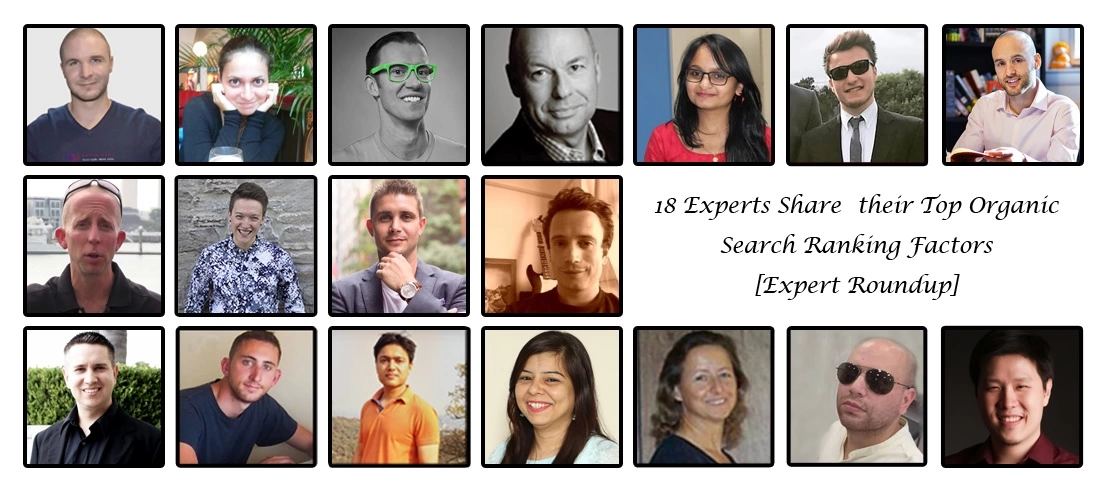We all know that SEO (Search Engine Optimization) is one of the key factors of the success of any organic campaign and play a very important role in online traffic acquisition strategy. As we already know, SEO involves a number of techniques and tweaks to the website to improve a website’s search engine rankings and maximize your organic traffic.
We surveyed 17 experts and their answers on “What are your Top Organic Search Ranking Factors?”
I encourage you to go through all the contributors’ answers, as there might be any helpful tips that you can implement right away and give your website a boost in SERPS and traffic.
So let us jump right into the answers!
We’ll start from Sam Hurley

Sam Hurley
I generally don’t tend to intently focus on ranking factors — We already know the top 3 factors (previously confirmed by Google) as links, content, and RankBrain (its AI algorithm).
Despite not knowing the order of the first two, they go hand in hand when links are earned.
That’s why I invest all my energy and time into creating exceptional content and solid relationships — When built and sustained, the most important optimizations for ranking factors are almost run on autopilot…
A testament to this: My website naturally gained links from 195+ credible domains (including Inc, Forbes, Muck Rack, The Next Web, etc) before it even went live!
Of course, you must know the technical intricacies of SEO to get indexed and ranked appropriately in the first place.

Nevyana Karakasheva
Nevyana Karakasheva is a managing partner at OptiLocal, an SEO agency, specializing in Local SEO. Nevyana’s key field of expertise is Content Marketing, Reputation Management, Local SEO, and Link Management.
I guess you’ve inspired me 🙂 Here is my take on your question: Starting with the mainstream stuff – keeping up a mobile-friendly, speedy website with relevant structured markup, and keyword-strategized on-site content referred by a number of respected online sources. To put it simply – my top organic ranking factors are quality inbound links with varied and not keyword-stuffed anchor text, site mobility, high site speed, semantic markup, and great regularly fed content.
The devil is in the details: eliminating indexing issues, maximizing on your crawl budget, improving site architecture and internal linking, topped by improving outdated content.
Your organic SEO is not an island – to paraphrase the old saying😊 Local businesses need to do some extra work to enjoy local ranking just as well and here comes the crucial need to ensure against citation inconsistency.

Don’t chase the search algorithm, chase a great user experience. By doing this you will also make your website “organic SEO” as friendly as possible. If the page is easy for a reader to understand, then it’s easy for the search engines like Google to understand. If your page loads quickly that is great for the user, and guess what, the search engines reward you for it. Short title tags that are relevant to the content on the page and easy for the site visitor to understand, you got it, search engines like it too. When it comes to SEO, simple wins, but simply doesn’t mean it’s easy. But, your hard work will pay off in the long run.

Timothy Hughes
If you want to rank highly in organic search you need excellent content. Not just good content. It has to inspire, engage…. I call it the “Dinner party test”. Can you read out your content at a dinner party and you don’t get told to shut up and you are even invited back? The same as a Dinner Party if you don’t engage, you talk about yourself, like your content it will be a lonely existence.

Kunjal Panchal
Kunjal Panchal is a former SEO Analyst turned digital marketing consultant with an exposure of more than a decade in the Internet marketing industry.
I consider the below factors for organic search ranking.
- Keyword in the Title tag, URL and of course, in the body of the content
- Page Loading Speed
- Useful and relevant Content
- Website traffic
- Quality backlinks
- HTTPs – this can help indirectly.

Hamish
Hamish FitzHenry – Head of Search at Grizzly
“When it comes to search ranking factors, content and backlinks are still the most critical components. Content has been a very important ranking factor for quite some time now, however in the last few years we’ve definitely seen a shift away from keyword-focused content and more towards highly relevant content written in a natural conversational tone. Algorithm updates like Hummingbird place more value on semantic
relevance now, thus in-depth articles on one specific topic will always
beat out unreadable keyword-dense content.
Backlinks also still remain a crucial search-ranking factor. Backlinks from relevant and authoritative domains will always benefit your search ranking. The key to gaining these backlinks is through compelling content that adds value for the reader.”

Cameron Conaway
Valuable content can always rank well for high-volume, low competition keywords, and queries, but the state of SEO seems to be increasingly rewarding sites with all three of these in place:
1. An HTTPS domain;
2. A rich backlink profile (although sometimes a single authoritative backlink containing a keyword in the anchor text is enough); and,
3. Properly formatted and coded content.

Michael Kawula
Our top 2 organic search ranking factors are:
Quality of the Content: Whether it’s content we create for our site or guest post we occasionally accept, we always want to make sure it hits on what business owners should really care about and that’s, will the end reader be able to take action on what we shared and add value to their business.
That means no fluff, like just adding words to make your content “long-form”.
We also look to assure the content appeals to different types of readers’ desires by adding images, infographics (using Venngage), video, and more.
Lately, we’ve started to use Animoto, a great video creation tool, more inside of our content to highlight different parts of the post. This allows us to also take that video and remarket the content on various social sites like Facebook, Twitter, and Instagram.
We’ve also started to use interactive quizzes inside our content, using a tool like Interact. Doing this gets the reader more engaged, interacting with the content, increases shares, and gets them engaging with other content that the quizzes can funnel too.
Marketing our Content: Regardless of how good a piece of content is, if no one knows about it, you won’t show up in any search rankings.
Backlinks are important and for most content creators, this doesn’t happen by itself.
You need to do outreach to other content creators who can link to your content and make sure that they’re high domain sites and diverse.
Getting high domain sites to link to you won’t happen overnight, so start with decent authority sites and work your way up. To learn more about this strategy follow folks like Brian Dean, Neil Patel and I love Robbie Richards content.
For tools, we love using SEMRush and BuzzSumo.
A strategy that works well is mentioning in your content those who you’ll reach out to and doing so authentically. Highlight their work in your content. For example, above I’ve mentioned several tools and influencers who would be great examples of who to reach out to, for this post
One last point, have a social presence and get your content talked about. More people will link to popular content that is shared more and that will earn you a higher spot in organic search.

Lindsay Kavanagh
Account Manager, SEO Specialist in Ottawa, Digital Marketer. SEOplus+
What are your Top Organic Search Ranking Factors?
Content is King when it comes to SEO
When trying to beat your competitors to the top of the SERPs – creating content can help for many reasons. The Googlebot loves content, but users love it more. Adding valuable content to your site can help improve important ranking metrics like time on site, bounce rate and pages per session (because users will actually read what you write!) – Which are also important metrics to determine who ranks at the top. Content allows you to show your expertise and knowledge in the market which can help you convert new users into customers (which helps your business and rankings!). Pages and blogs can help you rank for short and long-tail keywords which will then help maximize your online exposure as well. You can also obtain backlinks by developing valuable content for your site.
Valuable content holds the ability to increase our rankings through improving user metrics, obtaining backlinks, converting your traffic, and beating the competition to the top of the SERPs.

Aaron
The top organic search ranking factors I’m tracking now and into 2018 include:
- The number and quality of links pointing to a site
- The length and quantity of QUALITY content
- On-site user metrics (such as bounce rate, time on site, etc.)
None of that is revolutionary, nor are they difficult metrics to improve upon. But I’m excited to see so much focus on delivering genuinely great customer experiences on-site, rather than just mimicking quality web experiences to manipulate the rankings. Improving on these particular metrics takes time, but leads to added business benefits besides higher rankings alone.

Joe
Google announced RankBrain as its artificial intelligence learning system. They later announced it as the third most important ranking factor. While backlinks will still be king in 2018, I see the shift starting to move more towards content. On-page optimization will of course still include keyword targeting but to make your content truly RankBrain friendly, it needs to offer the best user experience from the SERPs to your content.

Steve
The top organic ranking factors from our experience revolve around content and links, irrespective of technical obstacles.
Our clients who invest in designing and writing the absolute best answer to a query and fast-follow with supportive (top of the funnel) content to build authority and links seem to do the best in terms of the array of keywords their primary copy (bottom of the funnel) ranks for, and in terms of overall position within search engine results.
Example: attorney invests $10,000 into the “end all page” to rank for a car accident lawyer in their city, and then builds all sorts of pages with statistics, accident checklists, helpful guides, and other link-able content under the Car Accidents taxonomy. Within 4-6 months the attorney typically appears on the first page of Google in their target city for 500-1000 search terms identifiable within Google Search Console’s Search Analytics section (filtering only the primary target URL).
The disconnect revolves around Quality, as you can’t build a genuinely awesome page that invokes sales principles, usability best practices, conversion rate optimization, HD 1080p video, and unique HD imagery on a shoestring budget. Resources skilled in these areas expensive and worth every penny.

Dave Schneider
Dave no longer runs these websites but can be found at lesschurn.io and daveschneider.me
We are firm believers in the power of link building, so backlinks is our top 1.
Numbers two and three would have to be website performance and mobile optimization. Pages need to load fast enough for both desktop and mobile, ads and images should display properly, text size is readable… you get the picture.
Number four would have to be topically optimized content—that means long-form articles that answer most of the common questions associated with the topic we choose to write about that day.

Siddharth Gupta
Co-Founder at NotifyVisitors and InviteReferrals
We focus on long-tail keywords. Long-tail keywords have less competition and higher purchase intent as compared to direct keywords. “Cleaning service in Manhattan” is much easier to rank as compared to just “Cleaning service”. Another important factor is to remove bad backlinks.

Mansi
Long-form and relevant content:
Creating long-form content helps you drive organic traffic, increase social shares, and user engagement.
Quality Backlinks:
Aim for quality over quantity. A single link from a well-known authoritative site goes much further in increasing your SEO rankings than getting hundreds of links from smaller unknown websites.
I’ve found that if you do these two well, the other factors don’t matter as much.

Gail Gardner
SEMrush recently published a study written about by SearchEngineJournal illustrating the Top 17 Ranking Factors. Let’s distill those down into what to focus on. First, only publish comprehensive, long-form, very visual content. Each piece of content should target one 2-3 word keyword phrase. That phrase should be used in the title, at least one sub-title, the URL, the body of the post, and the alt-text for the post featured image. (ALL your content has images and other media, right?) My content often contains multiple images, current statistics, at least one video, a SlideShare, and often an infographic. In that content or at the end of it, always suggest at least one additional post or page on your site, This will increase your visitors time on site and pages per session. It will also reduce your bounce rate. This type of content is what is most likely to attract incoming links from multiple sites. So this one strategy pretty much covers the most important ranking factors.

Ashok Sharma
Ashok Sharma is a writer, digital marketer, and social media enthusiast. Ashok is a Digital Marketing Manager at GrayCell Technologies.
If you want to rank highly in organic search, we should work on following the technical part:
Site speed is a major Google ranking factor | Bounce rate | Total quality backlinks | Technical On-page SEO Elements| Content length (Always recommend to create 2000+ word because studies found that longer content performed better in Google)

Sean Si
Start-up addict and urgency junkie. Founder and CEO of SEO Hacker
Since the majority of the SEO landscape is dictated by Google, my team and I tend to focus on the ranking factors that Google has enumerated which wouldn’t come as a big surprise since most SEO specialists do it. And we all know that the top three ranking factors for Google would be:
Content – As most content writers say “Content is King”, and it really is. Because this is the primary way on how Google determines if a website’s content answers a user’s query, and what the website is all about.
Links – Links, as most of us know, is one of the most important factors to increase a website’s rankings. It helps Google determine whether your website is trustworthy, authoritative, and high-quality.
Rankbrain – Google’s machine-learning artificial intelligence system that gives users the most relevant results is the top three ranking factor as confirmed by Google. I actually wrote something about how Rankbrain affects SEO to give our readers a little hint of what Rankbrain can bring to the SEO landscape
Bonus Tip

Vladimir Gendelman
Vladimir Gendelman is the founder and CEO of CompanyFolders, winner of multiple awards, including ranking in Inc.’s list of 5000 fastest-growing private companies in America for three consecutive years and counting. He is a thought leader in print design and digital marketing and has published a variety of articles in major publications, including Forbes and Time.
“Content and links are synonymous with each other as the biggest organic search ranking factors. Links are the foundation of Google’s algorithm and is certainly one of the most important ranking factors. Content helps with that in a huge way because if you have a great piece of content, you can get links. Thus, ranking for your target keywords.”
I hope the insights from the top industry leader will help you to hit the right SEO strategy.








